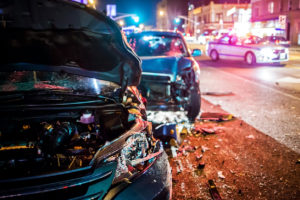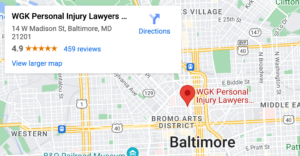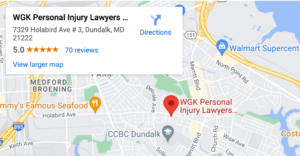
A car accident can happen to anyone. You can take your eyes off of the road for just a second and you rear-end another vehicle. Your child asks you a question and you miss the light changing and cause a red light accident.
If you are at fault for a car accident in Maryland, you can be held financially liable for damages caused by the crash.
Maryland is a fault state for all types of car accidents, including collisions involving pedestrians, large trucks, motorcycles, and bicycles.
Table of Contents
What Does it Mean to Be a Fault State for Automobile Accidents?
In a fault state, the party who caused the accident is liable for damages sustained by the victims. Damages can include, but are not limited to:
- Medical treatment, including surgeries, hospitalizations, therapy, medications, doctor’s bills, and medical equipment
- Loss of income, including benefits, commissions, wages, bonuses, and other sources of income
- In-home health care or personal care
- Future damages related to a permanent impairment or disability
- Scarring and disfigurement
- Mental and emotional distress and anguish
- Loss of quality of life or enjoyment of life
- Physical pain and suffering
- Psychological injuries, including PTSD, anxiety, and depression
Once the victim proves that you caused the car crash, you could be held liable in court. A jury or judge could award the victim hundreds of thousands of dollars in damages.
Maryland Drivers Must Carry Liability Car Insurance

All Maryland drivers are required to carry minimum liability car insurance. Bodily injury coverage compensates victims for their injuries and damages caused by the accident. Property damage coverage compensates victims for the damage to their vehicle caused by the collision.
In most car accident cases, the insurance company for the at-fault driver handles the insurance claim. Your insurance company assigns an adjuster who works with the victim to settle the claim. The adjuster investigates the crash to verify that you caused the car accident.
After verifying liability, the insurance adjuster begins reviewing the information submitted by the victim related to damages, such as medical records, proof of loss of income, and medical bills.
At this point, there is nothing for you to do. Your insurance company works with the victim or the victim’s personal injury lawyer to negotiate a settlement of the claim. Catastrophic injury claims, including claims involving brain injuries, spinal cord injuries, and amputations, are worth more than claims involving minor injuries or injuries that heal fully without causing permanent disabilities.
When the case settles, your insurance company should require the victim to sign a settlement agreement that releases the insurance company, you, and any other parties from further liability for the claim.
You may want to verify that this is the case to ensure that you are not surprised by a personal injury lawsuit a year or two after you thought the car accident claim had been settled. Insurance companies are known for protecting their best interests, even at the expense of a victim or an insured.
When Can I Be Sued for a Car Accident That Was My Fault?
The victim can file a personal injury lawsuit against you at any time after the wreck. The victim is not required to try to settle the claim with your insurance provider. Most car accident claims are settled between the insurance company and the victim without a lawsuit being filed.
However, there are three common reasons why a victim might file a personal injury lawsuit against you for a car accident.
Your Insurance Policy Does Not Cover the Victim’s Damages in Full
Maryland requires drivers to carry minimum car insurance in the amounts of:
- Bodily injury car insurance for damages to a single victim $30,000
- Bodily injury car insurance for damages to more than one person in the same car accident $60,000
- Property damage coverage $15,000
The insurance coverage might not compensate the victim fully for all damages. The victim might choose to file a lawsuit against you seeking full compensation. If a jury awards the victim an amount above your policy limits, you are personally liable for that amount.
Your insurance company pays the victim an amount equal to your policy limits. The victim can pursue other legal remedies to collect the rest of the judgment from your personal assets.
Your Insurance Company Denies Liability for the Claim
If your insurance company denies liability for the claim, the victim might choose to file a personal injury lawsuit. The lawsuit is filed against you. In most cases, your insurance company hires an attorney to represent you in the lawsuit.
However, you have the right to hire a lawyer to represent you personally. The lawyer hired by the insurance company might not protect your best interests over the company’s best interests. Depending on the facts in your case and the potential for personal liability, you might want to talk with a lawyer.
Your Insurance Company Refuses to Negotiate a Fair Settlement
You cannot force your insurance company to settle a car accident claim. You cannot force it to pay the victim an amount to “make the claim go away.”
If the insurance company refuses to negotiate a fair settlement amount with the victim, the victim might file a car accident lawsuit. Again, the lawsuit is filed against you personally. Even if the insurance company hires an attorney to handle the lawsuit, you might want to consider speaking with an attorney to discuss your legal rights.
What Can I Do to Protect Myself From Liability for a Car Accident?
Practicing good driving behaviors is the best way to avoid causing a car accident. Never operate a vehicle while you are drowsy, intoxicated, or distracted. Obey all speed limits and other traffic rules and laws.
If you have substantial personal assets, you might want to consider purchasing higher amounts of car insurance. High-net-worth individuals can also purchase umbrella policies to protect themselves and their assets from liability for a car accident claim.
Because a car accident can happen to anyone, it is wise to carry the highest amount of liability insurance your budget allows. You should also protect yourself by carrying optional car insurance coverage if you are the victim of a car accident.
Underinsured motorist coverage, uninsured motorist coverage, and Personal Injury Protection (PIP) coverage can compensate you if you are involved in a car accident that is not your fault. PIP coverage is no-fault insurance. It could pay medical bills even if you caused the crash.
Never Admit Fault Without Talking to a Lawyer
Even if you believe you could have contributed to the cause of a car accident, you might want to talk with a car accident lawyer. Until an investigation is complete, you cannot be sure whether you are 100 percent at fault or if the other driver contributed to the cause of the accident.
Under Maryland’s strict pure contributory negligence laws, if the other driver contributed to the cause of the crash in any way, the driver is barred from recovering any money for damages.
Therefore, never admit fault or apologize for a car accident. Talk with a car accident attorney first to discuss your legal rights and your options for recovering compensation for injuries and damages.
Contact our Baltimore office to schedule a free consultation, you can give us a call at (410) 837-2144 to speak with an experienced Maryland personal injury lawyer at WGK Personal Injury Lawyers.


